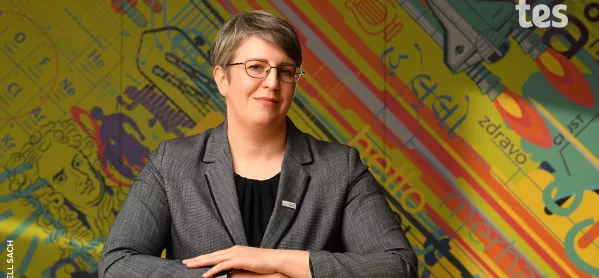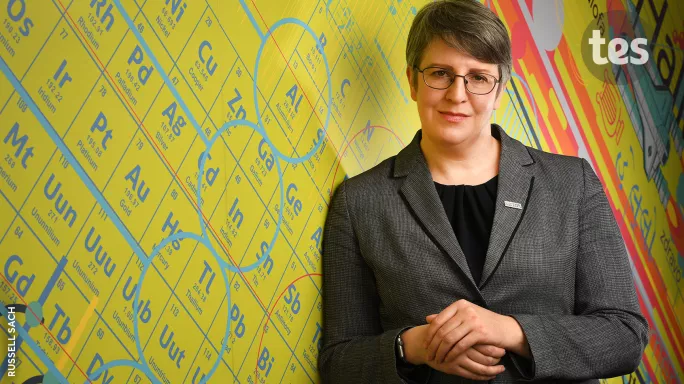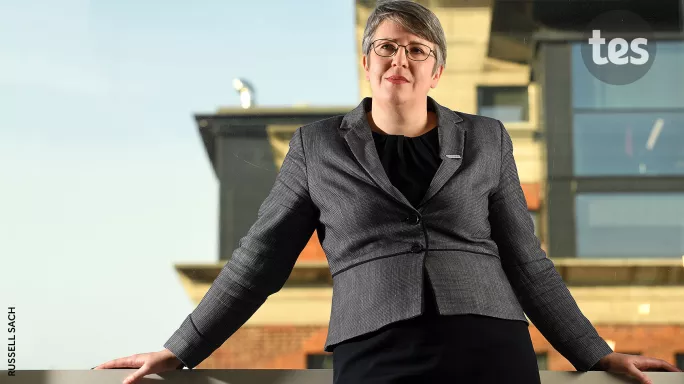- Home
- Meet Kirsti Lord: AoC’s musical deputy chief executive
Meet Kirsti Lord: AoC’s musical deputy chief executive

Growing up in Worcestershire, Kirsti Lord felt that she didn’t quite belong.
In the 1980s, she was a student at the Alice Ottley School, a private girls' school, and while her peers were picked up in Bentleys and went horse riding on weekends, she walked home to her terraced house and spent her spare time in the front room – which doubled as her granddad’s bedroom – in front of the gas fire watching black and white TV.
“I was caught between different worlds. Kids would come to my house once and that was it. The kids on my street wouldn’t talk to me because I went to the posh school and all the kids at school were nice but didn’t want much to do with my home life,” she says.
Background: Association of Colleges names new deputy CEO
Opinion: The true ‘gold standard’ for Levels 4 and 5 is FE
More: 'Unconditional offers are letting students down'
Joining the Association of Colleges as deputy chief executive in 2017 was again a move that may have made her feel like a fish out of water.
“The AoC, that’s fancy, isn’t it? It was beyond anything I’d comprehended, totally outside of my comfort zone,” she says.
“I remember in my first year, I went to a parliamentary reception and I thought to myself: how am I eating canapés at the House of Lords? Who are you? And who do you think you are?”
Lord experienced further education for herself before going on to work in a variety of roles across the sector, influencing thousands of lives along the way. But her path, like many who work in FE, was full of twists and turns.
‘I didn’t see the point of education’
Lord says she loved primary school, but quickly lost interest in education as a teenager.
“I didn’t see the point of education, it was something I had to do. I didn’t know a lot about tenacity when I was young, so if I couldn’t do it first time around, I gave up on it. I had no plans for the future,” she says.
Her father, on the other hand, did have plans for her. A proud socialist who was “a snob in the complete opposite direction”, he wanted his daughter to either get married and have a family or become a lawyer or doctor.
When she was 16, he enrolled her into Alice Ottley’s sixth form and chose her A levels. Lord rebelled and enrolled herself at the local state sixth form, a move which caused “a lot of drama”. She won half the battle, stayed on at the state sixth form, but studied subjects her father chose for her and spent the next two years “stumbling through” economics, religious studies and classics.
As her time at college came to an end, she went to visit a few universities, but found the experience overwhelming.
“The universities just terrified me. They were so huge and everyone seemed to know where they were going and what they were doing except for me. I decided I just wasn’t ready,” she says.
One thing was not up for question though – her passion for music, sparked by her regular trips to church with her mum. She laughs that it was a case of “join the choir or else”.

She took singing lessons, and it was these that became her ticket away from Worcestershire. Her singing teacher was part of a band, and suggested that Lord join them. After another huge row with her father, she moved in with her teacher and spent two years touring around the country singing backing vocals. There was one challenge, however – she couldn't sight-read music. She decided to do something about it, enrolling at North East Worcestershire College on a two-year classical music course. There, she studied courses from GCSE Italian and A-level music to theory in harmony, singing and piano skills.
'Going to college was transformative'
“It was transformative. I went from this person who was just doing education to get a full-time job to being really enthusiastic about it,” she says.
She lists her qualifications proudly – an A in music A level, an A in GCSE Italian, a grade eight in singing, a grade seven in theory and harmony, grade five in piano skills. For someone who “stumbled through” college the first time around, it shows what can happen when a love for what you’re learning is brought into the equation.
Eager to carry on her musical studies, Lord applied to five HE institutions to read contemporary classical music. A traumatic trip to London for interviews – “someone tried to mug me on the bus and I didn't really even notice because I was so naive” – ruled out moving to the capital. She was left with two options: Cardiff University and Dartington College of Arts. Feeling she couldn't identify with the students she saw at Cardiff, she settled on Dartington.
Falling into teaching
As part of her degree course at Dartington, she had to undertake a project that could lead to a potential career. Lord proposed going to teach music at Worcester College of Technology – and when her project came to an end, she was offered 16 weeks of work, teaching performing arts.
“I fell into teaching because I naively thought, 'Sixteen hours a week as a postgraduate – that sounds manageable.' I was forgetting about all the planning, the prep, the marking,” she says. To add more to the workload, she took another part-time job at Kidderminster College, teaching music – and it wasn’t plain sailing.
“For the first year, I really hated it. This was 2000. Teaching was, 'Here’s a specification, here’s the classroom, here’s a group of students, off you go.'
“It was sink or swim. There were weeks when it was brilliant, there were weeks when it was horrendous. But once you start making progress with students, then it’s the most amazing job in the world.”
A full-time teaching job at Josiah Mason Sixth Form College in Birmingham followed – where she soon took on a head-of-department role – and Lord began to rise up the ranks, seeking opportunities at a range of colleges. When a deputy principal job came up at City College Coventry, Lord applied and was successful. It was a 15-year journey from part-time lecturer to deputy principal of a big FE college.
“I think the reason I progressed so much is because I was irritated about how little control I had over situations,” she says.
“But what you learn is it doesn’t matter how far up the chain you go, there is always someone telling you can’t do something. I was determined to find a ceiling on that.”
When the principal of City College Coventry stepped down and a merger process began with another college, Lord applied for the principal role. Little did she know that the interview would change the course of her career.
Tackling systemic issues in FE
It was the Association of Colleges that was leading the recruitment process, and, although she was not successful in her application, it was suggested that there could be another opportunity waiting.
And so in 2017, Lord began working at the AoC. Being deputy chief executive means she is back in London for the first time after *that* memorable week when she was applying for university. She’s chosen not to relocate, instead spending around four hours a day commuting.
When she’s not travelling into London, she travels the country meeting with college senior leaders and chairing policy focus groups. It’s the part of her role that is most similar to teaching, she says.
“You’re facilitating people to be able to influence themselves – and when you plan an agenda it’s like planning for a lesson, except you’ve hopefully got people who are more engaged, and want to come along and be there,” she says.
“It’s taken time, but I’ve made connections with the Department of Education and there’s a level of trust there. I can tell them which principals would be good for a particular group. It’s the small things like influencing the teaching, learning assessment group and the pilot projects that are going to be rolled out on a bigger scale and benefit teacher recruitment and retention.
“I’m nibbling around the edges at the moment, but being able to contribute towards the issues that are systemic in the system, and that’s just really exciting. It’s met with 75 per cent frustration, but, like teaching, it's the breakthroughs that make it worth it.”

When talking about the systemic issues in FE, Lord comes alive. Number one on her list, like for most in the sector, is funding. “When you look at the pay difference between college lecturers and school teachers, how are we supposed to compete in terms of recruitment? People will deal with a lot for a £7,000 pay rise,” she says.
She also presses the importance of the marketisation of FE and increased competition between institutions. Too many in the sector are “piling in”, she says – schools are delivering vocational qualifications they shouldn’t be and universities are dipping into access courses and foundation years.
The value of creative subjects
“Everyone is trying to nibble at the edges of it: it’s quite a challenging place to be and historically colleges have been set up to compete with each other. In terms of collaborating and doing the work which would be fabulous for the community and provide the best offer possible, the system is set up not to allow it,” she says.
And it should be no surprise that the decline in performing arts provision, too, is a major concern for Lord. She says she’s worried about what the EBacc means for disadvantaged students whose parents can’t afford extracurricular dance or music lessons.
“How do they get exposure to that so they know that’s something they may want to do when they hit 16?” she asks.
“Not every arts student is going to become a professional, and that’s OK: no one expects an A-level student to be an academic. The soft skills you learn, like applying yourself, having tenacity, having communication skills. There’s a huge amount to be said for creative subjects, it helps your mindset, no matter what you go on to do.”
In her own life away from AoC, Lord hasn’t lost her passion for music. Up until a month or so ago, she was in a four-part jazz harmony band – for which her singing teacher when she was a teenager was the managing director. Her new year’s resolution for 2020 is to learn how to play the hurdy-gurdy, an instrument similar to a violin.
Much like Lord, the hurdy-gurdy is quirky and fun. But also like Lord, it does not lack distinctiveness.
Keep reading for just £1 per month
You've reached your limit of free articles this month. Subscribe for £1 per month for three months and get:
- Unlimited access to all Tes magazine content
- Exclusive subscriber-only stories
- Award-winning email newsletters



